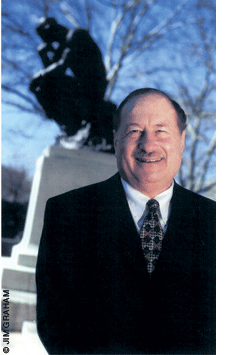
Class of ’60 | The year was 1997; the place, a federal court in Florida. Stephen Sheller C’60 L’63 sat listening to the expert testimony of an R.J. Reynolds research director. He had heard the company’s line before: that they had lowered tar and nicotine levels in cigarettes by more than 50 percent in the previous 25 years and were therefore responding to the health community’s demands by manufacturing cigarettes with steadily decreasing levels of tar.
That research director “was doing a demonstration using charts showing the total smoke volume in the average cigarette which a smoker inhaled was, on average, 500 to 600 milliliters of smoke,” Sheller remembers. “And I could not understand that chart, because it did not mesh with the fact that the FTC Cambridge filter tests, which all cigarettes were tested on, only used an average puff volume of 225 to 300 milliliters of smoke, or 50 percent less than the volume the average smoker inhaled per cigarette on modern day cigarettes.” That discrepancy skewed the results to favor the tobacco industry.
“This seemed to mean to me that the industry hadn’t reduced tar and nicotine levels at all over the 25-year time frame they claimed they did,” he adds, “and I was possibly onto one of the largest scams in history.”
Ultimately Sheller—the founder and managing partner of Sheller P.C., a respected plaintiff’s personal-injury and class-action law firm—prevailed against the tobacco company. He went after its “Achilles heel” with a new legal strategy: pursuing consumer-fraud class actions for recovery of money and disgorgement of profits and penalties in several states, based on those states’ consumer laws. Focusing on one brand at a time, such as the best-selling Marlboro Lights, Sheller put together a national team of lawyers to pursue these claims in several states, and eventually the strategy bore fruit.
“My efforts, I believe, ultimately led to a full review of light cigarettes,” he says, “and resulted in the release of Monograph 13 in November of 2001, where the public-health community now confirmed that the public was being misled by the tobacco-industry claims regarding light cigarettes and that steps needed to be taken to correct the public misperception.” That review and monograph confirmed that advertising for “light” cigarettes had been misleading. (Branding cigarettes as light is now illegal in Europe and Brazil, he notes—though not in the United States.)
Having recently received the Others Award, given by the Salvation Army to “an individual or organization exemplifying an extraordinary spirit of service to others,” Sheller sees himself as a crusader, working on behalf of people who have suffered at the hands of industrial expedience, and he deeply resents those who would paint members of his profession as parasites.
“I believe an intentional effort to create a stigma for lawyers pursuing class actions and personal-injury claims is part of an organized effort to undermine the ability of claimants to get a fair trial,” asserts Sheller, named by Philadelphia magazine as a Pennsylvania “Super Lawyer” for the past four years.
The latest frontier for consumer-rights advocates may be privacy, and this past June, Sheller’s firm filed a class-action suit against LendingTree.com over an alleged breach of security affecting the data privacy of its clients.
Looking back over the landscape of his career, which includes victories and favorable rulings in cases ranging from parental rights to corporate whistle-blowers, Sheller only voices one regret.
“There is one very important case I would have fought harder and taken even greater risks to accomplish a just result for our country, and that is Bush v. Gore,” he says. Within 48 hours of the 2000 election he had drafted a complaint enjoining the certification of Palm Beach County’s vote by Florida Secretary of State Katherine Harris, and successfully obtained an injunction. The team also sought a declaration that Al Gore had won the vote in that county by at least 2,000 more votes than he actually received, based on a statistical analysis. The judge rejected the statistical-analysis evidence, but ordered a recount and overruled Katherine Harris’ refusal to order it. And so started the battle that ended up in the United States Supreme Court.
Given that the high court’s decision led, indirectly, to the war in Iraq, Sheller adds, with no small note of bitterness: “I now know how important it was that I fought harder in Florida.”
But whatever regrets he may have, Sheller is delighted with the professional road he has chosen.
“I think if a young person wants to make a difference doing the most good in our world, with careful hard work, thinking out of the box and a steady moral compass, the law provides wonderful opportunities,” says Sheller. “They are there for those willing to take the risks required.”
—Jordana Horn C’95 L’99

